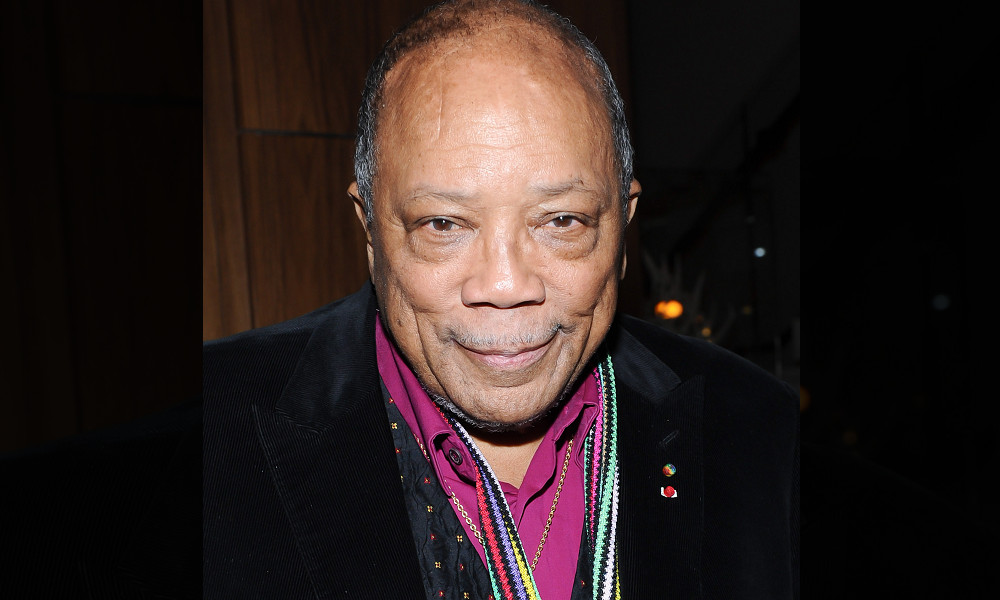Entertainment
Music legend Quincy Jones, who worked with Michael Jackson, dead at 91

Quincy Jones, the 28-time Grammy-winning musician, composer, producer and songwriter whose seven-decade career included Michael Jackson’s Thriller, frequent collaborations with Frank Sinatra, and the big-screen adaptation of The Color Purple, has died, his family says. He was 91.
Jones passed away peacefully while at his home in Bel Air, a neighborhood in Los Angeles County, on Sunday night, according to his publicist, Arnold Robinson. He was surrounded by his children, his siblings, and other close family at the time of his death.
“Tonight, with full but broken hearts, we must share the news of our father and brother Quincy Jones’ passing. And although this is an incredible loss for our family, we celebrate the great life that he lived and know there will never be another like him,” Jones’ family said in a statement. “He is truly one of a kind and we will miss him dearly; we take comfort and immense pride in knowing that the love and joy, that were the essence of his being, was shared with the world through all that he created. Through his music and his boundless love, Quincy Jones’ heart will beat for eternity.”
The statement said Jones’ family is grateful for the outpouring of condolences from his friends and fans around the world, but requests privacy to mourn. In lieu of flowers, the family asks that donations be made to The Jazz Foundation of America – jazzfoundation.org.
Quincy Jones’ biography, courtesy of his publicist:
Named by Time Magazine as one of the most influential jazz musicians of the 20th century, Quincy Jones is an impresario in the broadest and most creative sense of the word. His career has encompassed the roles of composer, record producer, artist, film producer, arranger, conductor, instrumentalist, TV producer, record company executive, magazine founder, multi-media entrepreneur and humanitarian. As a master inventor of musical hybrids, he has shuffled pop, soul, hip-hop, jazz, classical, African and Brazilian music into many dazzling fusions, traversing virtually every medium, including records, live performance, movies and television.
Celebrating more than 75 years performing and being involved in music, Quincy’s creative magic has spanned over seven decades, beginning with the music of the post-swing era and continuing through today’s high-technology, international multi-media hybrids. In the mid-50’s, he was the first popular conductor-arranger to record with a Fender bass. His theme from the hit TV series Ironside was the first synthesizer-based pop theme song. As the first black composer to be embraced by the Hollywood establishment in the 60’s, he helped refresh movie music with badly needed infusions of jazz and soul. His landmark 1989 album, Back On The Block–named “Album Of The Year” at the 1990 Grammy Awards– brought such legends as Dizzy Gillespie, Ella Fitzgerald, Sarah Vaughan and Miles Davis together with Ice T, Big Daddy Kane and Melle Mel to create the first fusion of the be bop and hip hop musical traditions; while his 1993 recording of the critically acclaimed Miles and Quincy Live At Montreux, featured Quincy conducting Miles Davis’ live performance of the historic Gil Evans arrangements from the Miles Ahead, Porgy and Bess and Sketches of Spain sessions, garnered a Grammy Award for Best Large Jazz Ensemble Performance. As producer and conductor of the historic “We Are The World” recording (the best-selling single of all time) and Michael Jackson’s multi-platinum solo albums, Off The Wall, Bad and Thriller (the best selling album of all time, with over 50 million copies sold), Quincy Jones stands as one of the most successful and admired creative artist/executives in the entertainment world.
Quincy Jones was born on March 14, 1933, in Chicago and brought up in Seattle. While in junior high school, he began studying trumpet and sang in a gospel quartet at age 12. His musical studies continued at the prestigious Berklee College of Music in Boston, where he remained until the opportunity arose to tour with Lionel Hampton’s band as a trumpeter, arranger and sometime-pianist. He moved on to New York and the musical “big leagues” in 1951, where his reputation as an arranger grew. By the mid-50’s, he was arranging and recording for such diverse artists as Sarah Vaughan, Ray Charles, Count Basie, Duke Ellington, Big Maybelle, Dinah Washington, Cannonball Adderly and LeVern Baker.
In 1957, Quincy decided to continue his musical education by studying with Nadia Boulanger, the legendary Parisian tutor to American expatriate composers such as Leonard Bernstein and Aaron Copeland. To subsidize his studies he took a job with Barclay Disques, Mercury’s French distributor. Among the artists he recorded in Europe were Charles Aznavour, Jacques Brel and Henri Salvador, as well as such visitors from America as Sarah Vaughan, Billy Eckstine and Andy Williams. Quincy’s love affair with European audiences continues through the present: in 1991, he began a continuing association with the Montreux Jazz and World Music Festival, which he serves as co-producer.
Quincy won the first of his many Grammy’s in 1963 for his Count Basie arrangement of “I Can’t Stop Loving You.” Quincy’s three-year musical association as conductor and arranger with Frank Sinatra in the mid-60’s also teamed him with Basie for the classic Sinatra At The Sands, containing the famous arrangement of “Fly Me To The Moon,” the first recording played by astronaut Buzz Aldrin when he landed upon the moon’s surface in 1969.
When he became vice-president at Mercury Records in 1961, Quincy became the first high-level black executive of an established major record company. Toward the end of his association with the label, Quincy turned his attention to another musical area that had been closed to blacks–the world of film scores. In 1963, he started work on the music for Sidney Lumet’s The Pawnbroker and it was the first of his 33 major motion picture scores. In 1985, he co-produced Steven Spielberg’s adaptation of Alice Walker’s The Color Purple, which garnered eleven Oscar nominations, introduced Whoopi Goldberg and Oprah Winfrey to film audiences, and marked Quincy’s debut as a film producer. In 1991 Quincy helped launch NBC-TV’s hit series, The Fresh Prince Of Bel Air, for which he served as an executive producer.
In 1990, Quincy Jones formed Quincy Jones Entertainment (QJE), a co-venture with Time Warner, Inc. The new company, which Quincy served as CEO and chairman, had a broad ranging, multi-media agenda which encompassed programming for current and future technologies, including theatrical motion pictures and network, cable and syndicated television. QJE produced NBC Television’s Fresh Prince Of Bel Air (now in syndication), and UPN’s In The House and Fox Television’s Mad TV, among other syndicated shows and television specials. In 1991 Jones founded VIBE Magazine, and with his publishing group VIBE Ventures, would go on to acquire SPIN Magazine before divesting his magazine interests.
In January 1992, Quincy Jones executive produced the An American Reunion concert at Lincoln Memorial, an all-star concert and celebration that was the first official event of the presidential inaugural celebration and drew widespread acclaim as an HBO telecast.
On March 25, 1996, Quincy Jones, executive produced the most watched awards show in the world, the 68th Annual Academy Awards. The show received widespread acclaim as one of the most memorable Academy Award shows in recent years.
In 1997, Quincy Jones formed the Quincy Jones Media Group. QJMG’s feature film projects in development include such highly anticipated films as the adaptations of the Ralph Ellison novel Juneteeth, David Halberstam’s The Children for Home Box Office in association with producers Kathleen Kennedy and Frank Marshall, a bio-pic on the 19th century Russian poet Alexander Pushkin, Pimp and Seeds of Peace for Showtime, among others. For television, QJMG is developing the sit-com The White Guy. QJMG is also active in live entertainment, direct response marketing, and cross-media projects for home entertainment and educational applications.
As a record company executive, Quincy remained highly active in the recording field throughout the 1990s as the guiding force behind his own Qwest Records, which boasted such important artists as New Order, Tevin Campbell, Andre Crouch, Patti Austin, James Ingram, Siedah Garrett, Gregory Jefferson and Justin Warfield. New Order’s album, Substance earned Qwest a gold album in 1987. Tevin Campbell’s T.E.V.I.N was both a critical sensation and major commercial success, and the label’s release of the Boyz N The Hood soundtrack album was among the most successful soundtrack recordings of 1991. Qwest Records has also released soundtrack albums from the major motion pictures Sarafina! and Malcolm X.
In 1994, Quincy Jones led a group of businessmen, including Hall of Fame football player Willie Davis, television producer Don Cornelius, television journalist Geraldo Rivera and businesswoman Sonia Gonsalves Salzman in the formation of Qwest Broadcasting, a minority controlled broadcasting company which purchased television stations in Atlanta and New Orleans for approximately $167 million, establishing it as one of the largest minority owned broadcasting companies in the United States. Quincy served as chairman and CEO of Qwest Broadcasting. In 1999, taking advantage of the rapid escalation of broadcast station values, Jones and his partners sold Qwest Broadcasting for a reported $270 million.
The laurels, awards and accolades have been innumerable: Quincy has won an Emmy Award for his score of the of the opening episode of the landmark TV miniseries, Roots, seven Oscar nominations, the Academy of Motion Picture Arts and Sciences’ Jean Hersholt Humanitarian Award, 28 Grammy Awards, and N.A.R.A.S.’ prestigious Trustees’ Award and The Grammy Living Legend Award. He is the all-time most nominated Grammy artist with a total of 80 Grammy nominations. In 1990, France recognized Quincy with its most distinguished title, the Commandeur de la Legion d’ Honneur. He is also the recipient of the French Ministry of Culture’s Distinguished Arts and Letters Award. Quincy is the recipient of the Royal Swedish Academy of Music’s coveted Polar Music Prize, and the Republic of Italy’s Rudolph Valentino Award. He is also the recipient of honorary doctorates from Howard University, the Berklee College of Music, Seattle University, Wesleyan University, Brandeis University, Loyola University (New Orleans), Clark Atlanta University, Claremont University’s Graduate School, the University of Connecticut, Harvard University, Tuskegee University, New York University, University of Miami and The American Film Institute, among others. In 2001, Jones was named a Kennedy Center Honoree, for his contributions to the cultural fabric of the United States of America. He was recognized by the National Endowment for the Arts as a Jazz Master – the nation’s highest jazz honor, and in 2010 was bestowed the National Medal of Arts, our nation’s highest artistic honor. In 2016, Jones received a Tony Award for Best Revival of a Musical for the Broadway production of “The Color Purple. The award completed the rare EGOT set for Jones, an exclusive club of artists who have received an Emmy, Grammy, Oscar and Tony Award.
In 1990, his life and career were chronicled in the critically acclaimed Warner Bros. film, Listen Up: The Lives of Quincy Jones, produced by Courtney Sale Ross, a film which helped illuminate not only Quincy’s life and spirit, but also revealed much about the development of the African American musical tradition. Reflecting on the changes in pop music over the years, Quincy says, “If there are any common denominators, they are spirit and musicality. I go for the music that gives me goose bumps, music that touches my heart and my soul.” Over the years, Quincy Jones has reached the essence of music and art: the ability to touch people’s feelings and emotions.
In 2001, Quincy Jones added the title “Best Selling Author” to his list of accomplishments when his autobiography “Q: The Autobiography of Quincy Jones” entered the New York Times, Los Angeles Times and Wall Street Journal Best-Sellers lists. Released by Doubleday Publishing, the critically acclaimed biography retells Jones’ life story from his days as an impoverished youth on the Southside of Chicago through a massively impressive career in music, film and television where he worked beside legends such as Billie Holiday, Ray Charles, Dizzy Gillespie, Count Basie, Ella Fitzgerald and Michael Jackson, among many others. In conjunction with the autobiography, Rhino Records released a 4-cd boxed set of Jones’ music, spanning his more than 5 decade career in the music business, entitled “Q: The Musical Biography of Quincy Jones.”
The audio recording of “Q: The Autobiography of Quincy Jones,” (Simon & Schuster) earned Jones his 27th Grammy Award, in the Best Spoken Word Category, while “Q: The Musical Biography of Quincy Jones” garnered him a 15th NAACP Image Award, in the category of Outstanding Jazz Artist.
In 2008 “The Complete Quincy Jones: My Journey & Passions,(Palace Press) examined the virtuosity of the man Frank Sinatra named “Q,” celebrating his prolific contribution to American art and culture. The book included a foreword by Clint Eastwood, preface from Bono, an introduction by Maya Angelou and an afterword by Sidney Poitier. Comprised of personal interviews and recollections from Jones, this collection peers behind the veil of celebrity, with extraordinary access to his creative inspirations and achievements.
With a long history of humanitarian work which began in the 1960’s and 70’s, Jones was one of the key supporters of Jesse Jackson’s Operation P.U.S.H. In 1985, he pioneered the model of using celebrity to raise money and awareness for a cause with “We Are the World.” The song remains the best-selling single of all-time, and raised more than $63 Million for Ethiopian famine relief. More importantly, however, it shined a spotlight on the Ethiopian drought and U.S. Government responded with over $800 million in aid.
In 1999 Quincy Jones joined Bono and Bob Geldof during a meeting with Pope John Paul II as a part of the Jubilee 2000 delegation to end third world debt. The delegation’s visit resulted in $27 billion in third world debt relief for Bolivia, Mozambique, and the Ivory Coast.

-

 Legal4 days ago
Legal4 days agoMichigan man JD Vance sentenced to 2 years for threatening Trump and JD Vance
-

 Politics5 days ago
Politics5 days agoU.S. to designate Maduro-linked Cartel de los Soles as terrorist organization
-

 World1 week ago
World1 week agoU.S. begins Operation Southern Spear against “narco-terrorists” in the Western Hemisphere
-

 Health5 days ago
Health5 days agoCambodia reports fatal H5N1 bird flu case in 22-year-old man
-

 World2 days ago
World2 days agoHurricane Melissa registered 252 mph wind gust, breaking global record
-

 Legal2 days ago
Legal2 days agoWoman in critical condition after being set on fire on Chicago train
-

 Legal1 week ago
Legal1 week agoImprovised explosive device detonates outside Las Vegas restaurant; no injuries
-

 World1 week ago
World1 week agoNationwide power outage hits Dominican Republic




